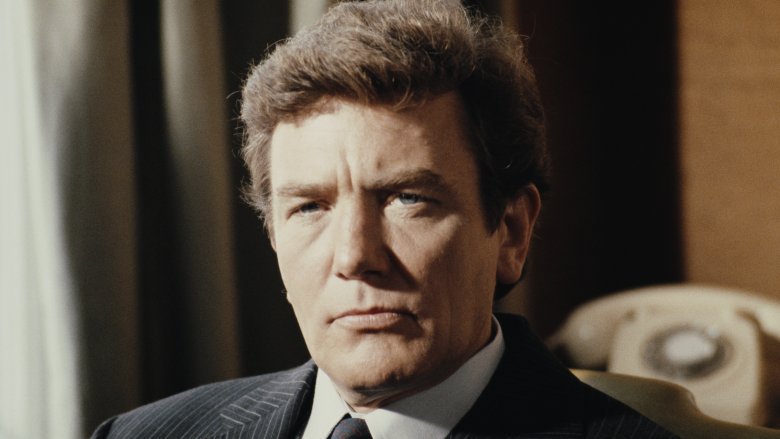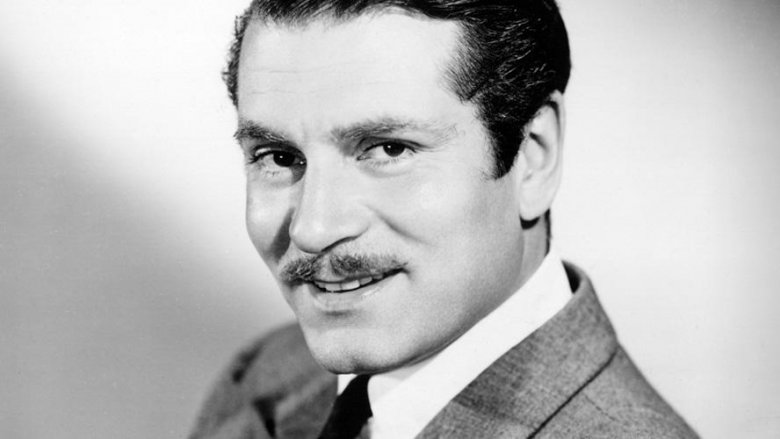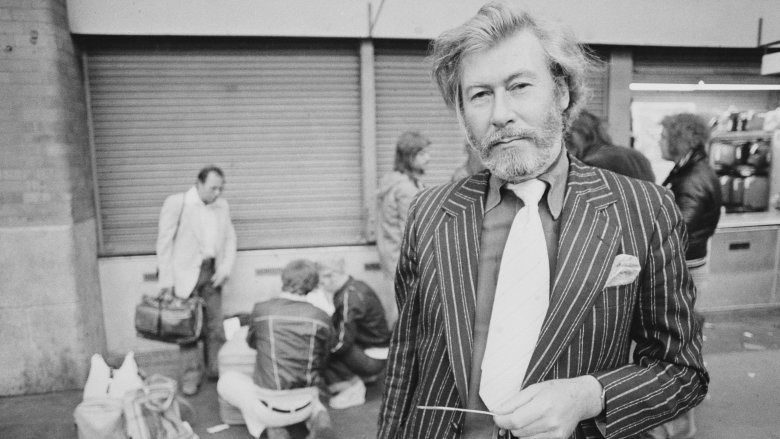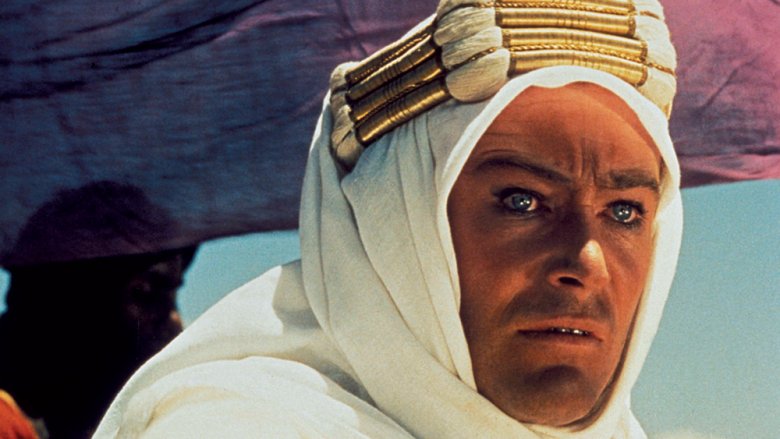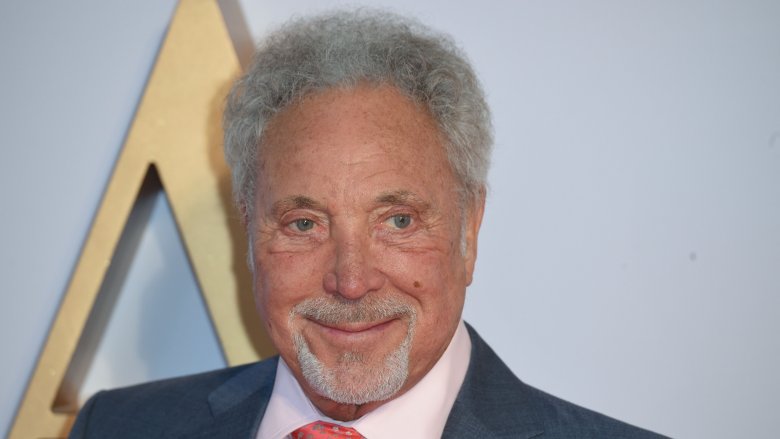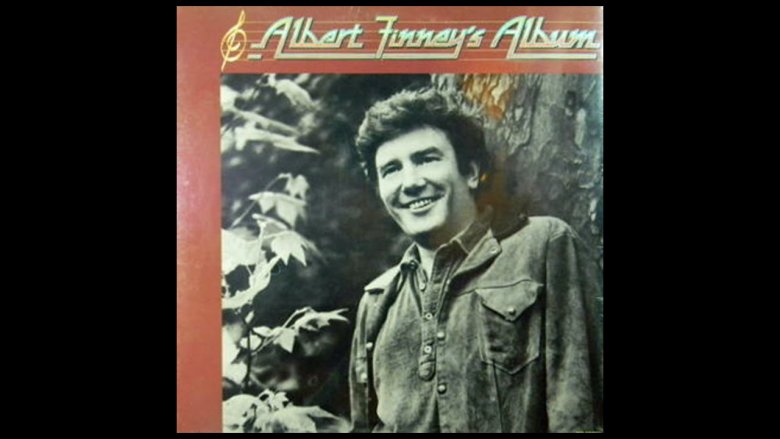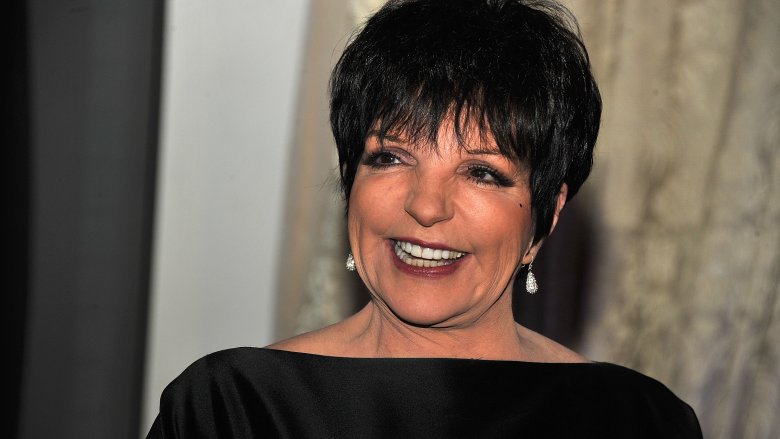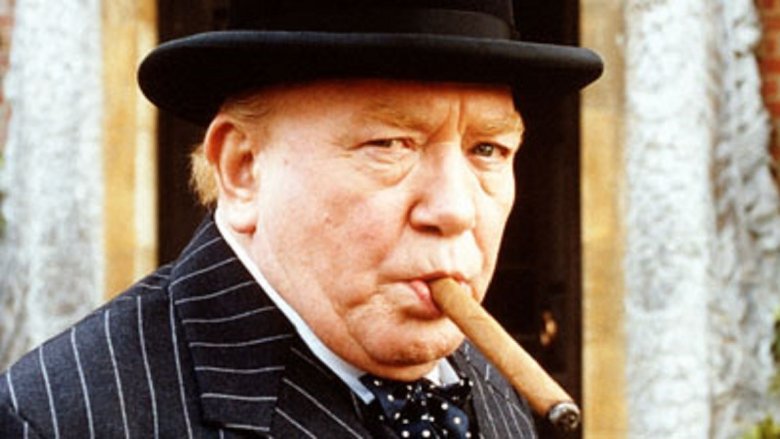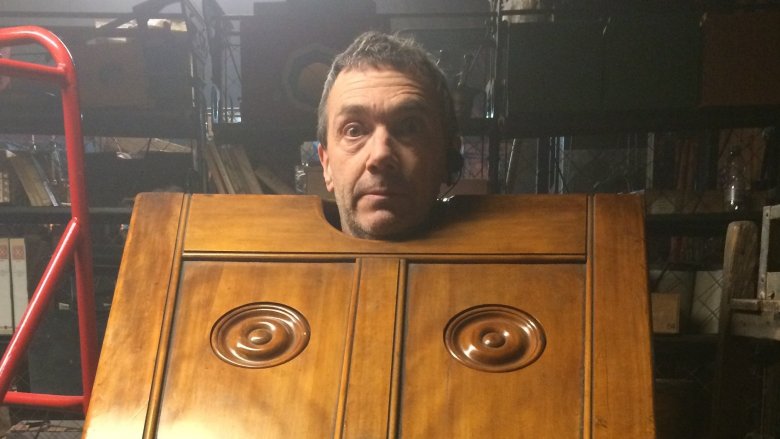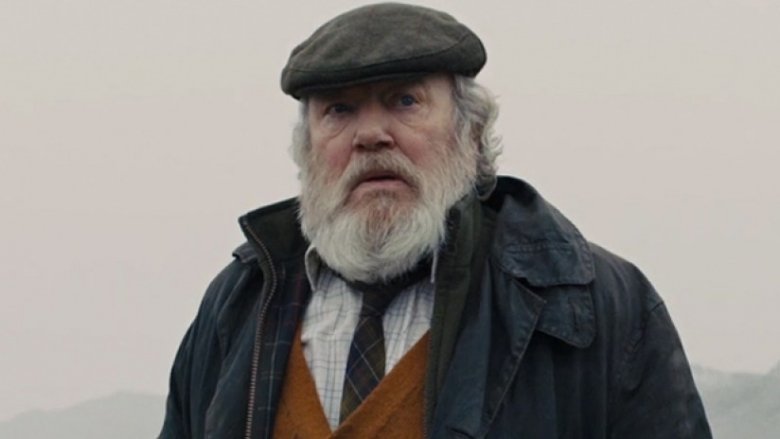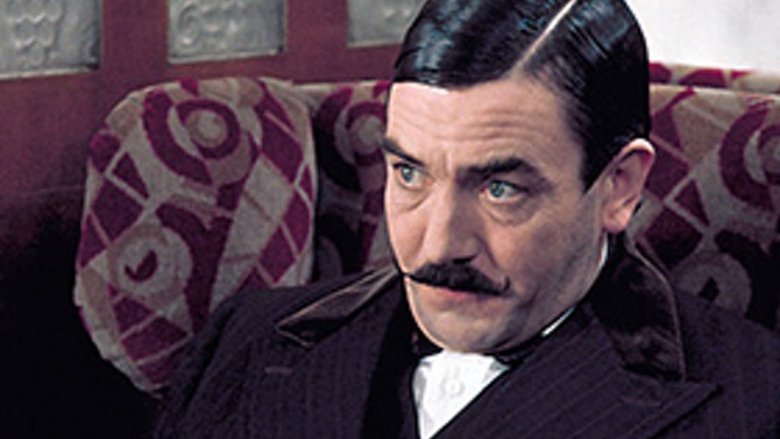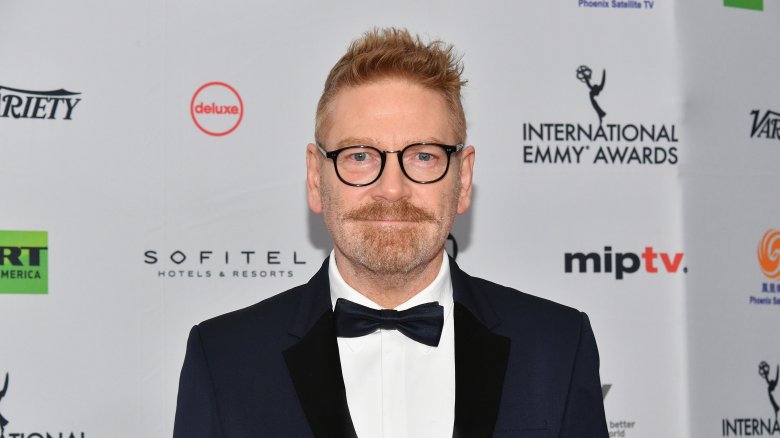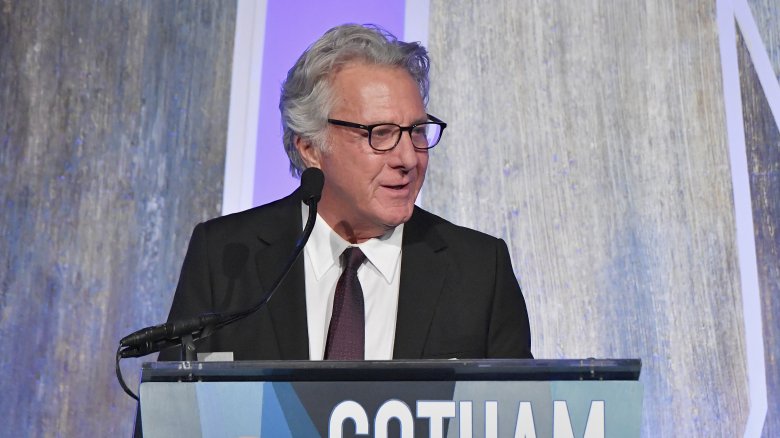The Untold Truth Of Albert Finney
In 1960, a promising young English stage actor named Albert Finney appeared on movie screens as Mick Rice, a British soldier sent to fight abroad in The Entertainer. Over the six decades that followed, Finney established himself as a true legend of both stage and screen before dying at age 82 in February 2019.
From his earliest silver screen appearances, Finney specialized in portraying working-class characters, a role that fit well for the son of a bookmaker. Finney famously avoided anything that suggested celebrity. He never attended the Academy Awards, despite being nominated for Best Actor four times. He also turned down an offer of knighthood in 2000.
A career as long and varied as Finney's will undoubtedly be rich with plenty of curious connections and interesting idiosyncrasies. You may recognize his face, but how much do you know about the man behind the rousing performances? In light of his awe-inspiring legacy, here are a few things you might not have known about the acting legend.
Sir Laurence Olivier helped launch his career ... twice
Like any number of English thespians who rose to fame on the stage, Albert Finney was hailed as "the new Laurence Olivier." And like any number of English thespians who were tagged with that lofty projection, Finney never quite hit Olivier's heights. But Finney had a front row seat to watching Sir Laurence work, and certainly made the most of his opportunities in the spotlight.
As a young stage actor in 1960, Finney was Olivier's understudy in the play Coriolanus. When Olivier came down with an illness, Finney stepped in to play the lead role to an eventual standing ovation. Later, he joked that the crowd seemed dazzled that he "had the costume on and [wasn't] in flannels." It was the beginning of a long, illustrious stage career for Finney.
The pair would move their collective work from the stage to the screen later that year, when Finney made his movie debut in The Entertainer. In the movie, Olivier played the protagonist, Archie Rice, an aging British music hall performer trying to stave off the end of his career. Finney played Archie's brother, Mick. The film was based on a play by English playwright John Osborne. Osborne's plays helped launch the careers of a number of English actors who also have connections to Albert Finney.
Finney connects to Oscar oddity through Osborne
For all of his acting success, the Academy Award is an honor that always eluded Finney — not that he much cared. When he earned his first Best Actor nomination for 1963's Tom Jones, the actor went sailing during the ceremony. Finney frequently said he never considered attending the Oscars, lamenting that sitting through such a long show without being able to drink or smoke wasn't his "idea of a good night." Nonetheless, Finney was nominated five times (four times for Best Actor and once for Best Supporting Actor) but never won a gold statue. That distinction puts him behind only fellow Brits Richard Burton (seven nominations) and Peter O'Toole (nine nominations) as the men with the most nominations but no wins.
Finney wasn't the first to find on-screen success with the work of John Osborne. In 1959, Richard Burton starred in Look Back In Anger, written by Osborne. Burton plays Jimmy Porter, an angry young man railing against the middle-class values of the time. Both movies came from a series of plays known as "kitchen sink dramas," showing a bleaker, angrier side of British life, with topics that hadn't previously been portrayed in English cinema.
Osborne never quite worked with O'Toole but it wasn't for lack of effort. The writer lobbied O'Toole to star in Dejavu, a sequel to Look Back In Anger. After wavering on joining the project, the actor ultimately decided to decline and instead announced his retirement from stage acting.
Finney turned down Peter O'Toole's star-making role
Albert Finney and Peter O'Toole have connections extending back decades, to when both were students at London's Royal Academy of Dramatic Art. Finney graduated with an acting degree from RADA in 1956, with O'Toole graduating the following year.
When director David Lean was beginning work on Lawrence of Arabia, he originally wanted Albert Finney for the lead role of T.E. Lawrence. Finney turned the offer down because producer Sam Spiegel wanted the actor to sign a five-year contract. "I don't know where I'll be in five years' time, or tomorrow for that matter," he once said. After considering a number of other leading men, the filmmakers decided upon O'Toole. The performance became a breakout role for O'Toole and earned him a Best Actor nomination in 1962.
Veteran film critic Rex Reed talked to Albert Finney for his 1969 book, Conversations in the Raw. The actor claimed that after declining Lawrence of Arabia, he went to Glasgow to do theater for $42 a week, saying he "didn't want to become a Hollywood property or spend two years in a bloomin' desert." It's not the only time Finney and O'Toole were connected to the same role. O'Toole starred in Hamlet when the Royal National Theatre opened its home at the Old Vic, and Finney took the title role when the Royal National Theatre ended its stay 13 years later.
Finney helped singer Tom Jones get his name
Albert Finney's true breakout role was in 1963's Tom Jones. Finney played the title character, an illegitimate child raised by a wealthy landowner who grew into a handsome young man with a lust for both life and the opposite sex. The portrayal landed Finney his first Best Actor nomination and became one of his signature performances.
About the same time, a young Welshman named Thomas John Woodward was performing in South Wales nightclubs as the lead singer of a band called Tommy Scott and the Senators. The band never took off, but a music manager named Gordon Mills heard Woodward's voice and thought he could be "the greatest singer in the world." One big problem, however, was that there was another Tommy Scott already singing in London. To avoid confusion, Mills changed Woodward's stage name to Tom Jones, inspired by the then-popular film. Coincidentally, the newly-minted Tom Jones sang with a group called the Playboys, and Finney would star in a film of the same name in 1992.
Despite the change in identity, success didn't come immediately for Jones. His first single, "Chills and Fevers," wasn't a hit. It wasn't until 1965, when "It's Not Unusual" hit number one on the British charts and reached the American top ten, that a singing star was truly born. Who knows if Tom Woodward would have reached the same level of stardom?
Finney was a singer in his own right
Albert Finney might have indirectly had a hand in the success of recording star Tom Jones, but the actor wasn't afraid to show off his own singing chops. In 1970, Finney took on the role of the miserly Ebenezer Scrooge in Scrooge, Ronald Neame's musical adaptation of Charles Dickens' A Christmas Carol. The film itself was nominated for four Academy Awards and it earned Finney a Golden Globe for Best Actor in a Comedy or Musical. In Annie (1982), Finney would not only sing and dance, but he also shaved his head to take on the role of Daddy Warbucks.
Finney did work with one of the giants of musical theater, though it did not afford him a chance to sing. The actor starred as a private detective in the 1971 movie Gumshoe. The film's score was written by Andrew Lloyd Webber, who went on to write blockbuster musicals like The Phantom of the Opera, Cats, Jesus Christ Superstar, and more.
However, Finney didn't limit his music stylings to the screen. In 1977, he recorded Albert Finney's Album, a collection of jazz tunes on Motown Records. Several years before, Irish actor Richard Harris had found success with "MacArthur Park" hitting number two on the Billboard Hot 100. Finney wouldn't have a similar outcome.
He helped launch Liza Minnelli's film career
Liza Minnelli was never a stranger to show business. As the daughter of entertainer Judy Garland and director Vincente Minnelli, Liza was born into Hollywood. Her official movie debut came in 1949 at the tender age of three, when she made an uncredited appearance at the end of In the Good Old Summertime. It would be years before she would appear in another film, instead honing her craft on stage as a singer, dancer, and musical theater actor.
Minnelli would return to the silver screen in 1968, playing the role of Eliza in Charlie Bubbles, which was the first and only feature film directed by Finney. In the movie, Minnelli's character was the secretary and mistress of the titular Bubbles, a famous writer who is divorced and generally bored with his own life.
It was the start of a long, successful film career that would see Minnelli accomplish something that Finney did not: winning an Oscar. She earned a pair of Best Actress nominations, one in 1970 for The Sterile Cuckoo and another in 1973 for Cabaret. Minnelli would take home the award for the latter role.
He played some major historical figures
When you have a career as long and as varied as Albert Finney, chances are good that you will be tabbed to play a number of historical figures. Finney has his share of famous and infamous real-life characters among his credits, including Winston Churchill in the 2002 TV movie The Gathering Storm. That role won Finney a Golden Globe for Best Actor in a miniseries or movie made for television.
Finney didn't limit his famous personages to the political sphere. In the 1963 play Luther, Finney played Martin Luther, the German theology professor who became one of the central figures of the 16th-century Protestant Reformation in Europe. The play gave Finney another chance to pair up with writer John Osborne and director Tony Richardson after the trio had worked together in The Entertainer.
In 1984, Finney played another notable man of the cloth on the small screen. The TV movie Pope John Paul II featured Finney as Karol Wojtyla, the Polish cardinal who was the head of the Catholic church from his installed in 1978 until his death in 2005.
Movies were a Finney family affair
Albert Finney was known for his numerous flirtations with women throughout his acting career, and was married three times. However, the actor had only one child. Simon Finney was born in London in 1958 to Albert Finney and his first wife, actress Jane Wenham. The pair divorced when the boy was three years old but, Finney remained active in his son's life.
Like his father, the younger Finney trended toward film, although he chose to work behind the scenes as a cameraman. In that role, Simon Finney and his famous father worked together three times. Their first collaboration was in 1998's A Rather English Marriage. They teamed up again in 2006 for Amazing Grace and once more in 2012 for the James Bond adventure Skyfall. The latter proved to be Albert Finney's final movie appearance. "I always threaten [Simon] with cutting him out of my will if I'm out of focus," he once joked.
Multiple bonds to Bond
Finney's final movie credit was the James Bond outing Skyfall in 2012. He played Kincade, the gamekeeper and custodian of Skyfall, the childhood home of the legendary spy. It was a role for which Finney was never originally considered. Director Sam Mendes first contemplated approaching the original 007, Sean Connery, for the role as a cheeky nod to the franchise's origins. The idea lasted only briefly before the filmmakers decided to go with Finney.
Finney was not the only RADA alum to take a turn in the James Bond franchise. Chinese actress Tsai Chin is perhaps best known in America for playing Auntie Lindo in The Joy Luck Club. But Chin graduated from the Royal Academy of Dramatic Arts in 1956 along with Finney, and appeared in two James Bond films. Her first appearance was in 1967's You Only Live Twice as Ling. Then in 2006, Chin was cast as Madame Wu in Casino Royale, putting her alongside Daniel Craig, much like her former classmate.
He also starred alongside James Bond
If it isn't enough that Albert Finney appeared in a James Bond film — in a role that could have gone to Sean Connery, no less — then how about starring in a movie alongside Bond himself? One of Finney's more notable performances came in 1974, when he played the famous detective Hercule Poirot in Sidney Lumet's film adaptation of Agatha Christie's Murder on the Orient Express. His portrayal of the fastidious investigator landed Finney the second of his four Best Actor nominations.
Part of Finney's success in the role came from his meticulous preparation. He gained weight and fashioned a waxed mustache to play Poirot. Despite the film's great success, Finney shied away from the role afterward, feeling as though he had been typecast. "People really do think I am 300 pounds with a French accent," he said.
But Finney was far from the only acting luminary in the film. The movie also starred Lauren Bacall, Ingrid Bergman, Sir John Gielgud, Anthony Perkins, Vanessa Redgrave, and of course, Sean Connery.
He's not the only RADA alum to play Poirot
The role of Hercule Poirot has been tackled by a number of actors including Charles Laughton, Peter Ustinov, and John Malkovich. Yet Albert Finney has the distinction of being the only actor to be nominated for an Academy Award for his portrayal of the fictional French detective. That year, however, the award went to Art Carney for Harry and Tonto.
But Finney was not the only graduate of the Royal Academy of Dramatic Arts to don the twirly mustache. Kenneth Branagh earned a diploma from RADA in 1981 and, like Finney, was compared to Laurence Olivier (Branagh portrayed Olivier in My Week with Marilyn). Like Finney, Branagh has never quite reached that pinnacle. In 2017, Branagh directed and starred in his own version of Murder on the Orient Express. He is slated to reprise the role again in 2020 for Death on the Nile, based on the Christie novel of the same name.
He nearly appeared in Dustin Hoffman's directorial debut
Skyfall was ultimately Albert Finney's final movie role. However, he was initially slated to appear in a film that was eventually released several months after the Bond movie. Quartet, released in 2013, was Dustin Hoffman's first directing effort. It tells the story of a group of estranged opera singers who meet at a retirement home and reconcile for a concert. Finney was selected to play Wilfred Bond, a still-randy musician who hasn't completely accepted the realities of his own aging process.
Finney was originally expected to star in the movie alongside Dame Maggie Smith and Sir Tom Courtenay (Finney and Courtenay worked together in The Dresser and A Rather English Marriage). A year after the announcement, Finney publicly acknowledged that he had been treated for cancer. Following that admission, Finney appeared in only two more films before his death. Eventually, he was replaced in Quartet by Scottish actor Billy Connolly.
